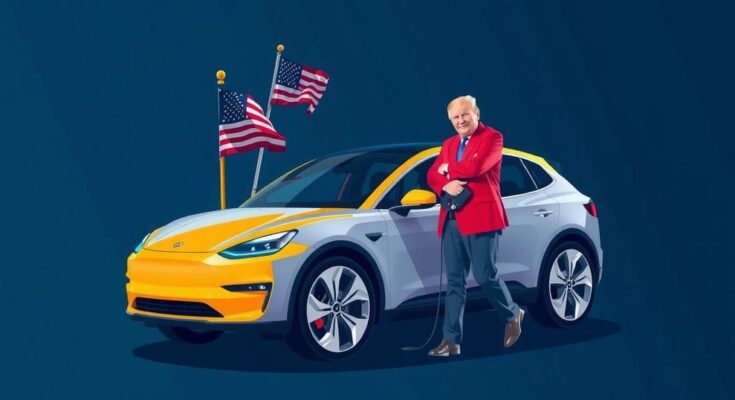President-elect Trump’s potential elimination of the $7,500 electric vehicle tax credit could significantly increase EV prices and reshape the market. Elon Musk supports this move, arguing it may solidify Tesla’s dominance while traditional automakers face greater challenges. Industry anxiety grows as manufacturers and advocates clash over the vital role of the credit in promoting electric vehicle sales and sustaining jobs.
The implications of President-elect Donald Trump’s potential elimination of the $7,500 electric vehicle tax credit could reshape the automotive landscape dramatically. Elon Musk, founder of Tesla, has voiced support for this move, suggesting it may benefit his company by solidifying its market dominance in the face of declining competition. The tax credit has long acted as a financial lifeline for consumers considering electric vehicles, but its removal may alter the dynamics significantly, particularly for legacy auto manufacturers like Ford and General Motors. As the motor industry tilts on the precipice of change, Tesla stands uniquely poised. Unlike its competitors, Tesla has enjoyed profitability on U.S. sales, while traditional automakers are still grappling with mounting losses in their electric vehicle sectors. Should the credit be rescinded, Tesla’s pricing power might strengthen, leveraging a diminishing competitive landscape. Contrarily, the Alliance for Automotive Innovation argues against the withdrawal of the credit, emphasizing its critical role in ensuring U.S. manufacturers can compete with advancing international markets. The Zero Emission Transportation Association also highlights the credit’s importance for job sustainability in Republican-leaning states. Without such incentives, the potential for an American resurgence in electric vehicle production dwindles, risking setbacks in job creation and investment. Analysts envision a grim future should the tax credit vanish, with some suggesting it would particularly hinder competitors like GM and Ford. In the realm of electric vehicles, the stark separation between Tesla’s scale and legacy automakers becomes apparent; without subsidies, the competitive edges held by these traditional firms diminish. In light of these developments, prospective buyers are urged to act swiftly. The convergence of tax incentives, currently slashed prices, and a potential surge in demand positions the market favorably for early adopters. Yet, impending cuts in production and rising demand could mean those dream electric cars may soon slip out of reach, making the present a fleeting window of opportunity.
The tax credit for electric vehicles has served as a significant motivator for consumers looking to invest in greener alternatives. With ongoing efforts to transition to electric vehicles spurred by both environmental concerns and economic incentives, the potential revocation of this credit represents a pivotal moment in U.S. automotive policy. The dynamics of the industry are changing rapidly, influenced by not only current economic factors but also by strategic decisions from manufacturers and policymakers alike. Trump’s administration could reshape these foundations, prompting a response from both the market and consumers.
In conclusion, the impending change brought about by Trump’s potential cuts to the electric vehicle tax credit may well redefine the automotive industry. While Tesla may benefit from a decrease in competition, the traditional auto industry risks facing significant challenges. Consumers are advised to make their purchases promptly, as the market dynamics shift, possibly leading to higher prices in the near future. The future of electric vehicles in America hangs in a precarious balance.
Original Source: www.cbsnews.com



